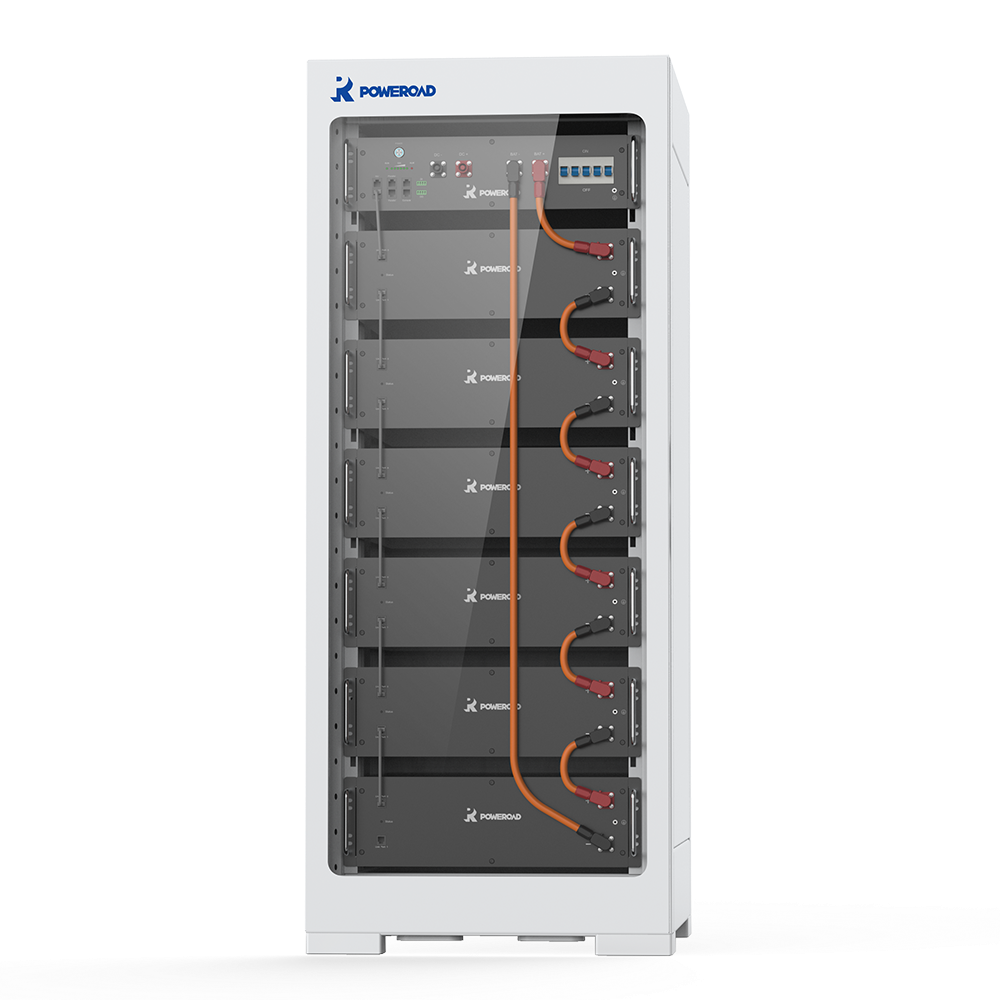

POWEROAD H-U10250HV 102.4V 52Ah racking residential LiFePO4 battery energy storage system with built-in own-developed BMS.
● Scalable from 5.32kWh to 212.99kWh power configurations.
● Modular design allows convenient installation, more operation.
● Safest LiFePO4 technology, sustained power supply.
● Long lifespan, up to 8000 cycles.
● Armed with POWEROAD designed BMS, three layer over current protection, safety first.
● Floor space sparing, allowing more space management.
● RS485, CAN communication support. Wi-Fi / BLE optional.
● Compatible with mainstream brand inverters: Growatt, Deye, Sunsync, Victron, Studer, Aiswei, Voltronic, MEGAREVO, Afore, SRNE…
● Remote access with Bluetooth / WiFi for monitoring, to reduce operation and maintenance costs.
The POWEROAD High Voltage Rack Battery H-U10250HV is a BESS that covers a variety of application scenarios, including backup power supply, peak shaving, and more. Users can extend the system capacity by connecting more battery modules to achieve a larger power and performance.
Given the credit to the POWEROAD BMS, the systems will automatically trigger four layer protection ensure powerful output and safety. Starting with 1 module of 102.4V 52Ah batteries, users can configure the system capacity according to requirement from 5.32kWh to 212.99kWh with easy installation.
We offer the best selections, giving you a wide range of choices of battery cells including CATL, CALB, EVE, and etc. All battery cells are UL1642/IEC62133/IEC62619 Qualified. You make the decision, and we handle the rest.
POWEROAD ONLY applies the top-tier conductors to the battery products, giving one of the best guarantees to reduce the resistance and boosts the performance.
POWEROAD has passed the major global manufacture certifications, we promise our customers a professional and rigorous production standard operation procedure, ensuring the build process is scientific and the build quality is solid.
POWEROAD has over 20 steps of inspections that covering before, during, and after the production, we deliver one of the most rigorous inspection SOP in the industry, assuring the product quality, improving the customer experience.
| Technical Spec | |
|
Battery Type |
LiFePO4 |
|
Nominal Voltage (V) |
102.4 |
|
Battery Capacity (Ah) |
52 |
|
Nominal Energy (Wh) |
5320 |
|
Cycle Life |
8000 |
|
Charge Voltage (V) |
115.2 |
|
Discharge Voltage (V) |
86.4 |
|
Recommend Charge/Discharge Current (A) |
10 |
|
Max. Charge/Discharge Current (A) |
25 |
|
Peak Charge/Discharge Current (A) |
50 |
|
Configuration (Max. in 1 Battery Group, pcs) |
8 |
|
Mechanical Spec |
|
|
Dimension (mm) |
442*450*145 |
|
Weight (Kg) |
44 |
|
Communication |
RS485, CAN |
|
Protection Class |
IP20 |
|
Cooling Type |
Natural cooling |
|
Working Temperature (℃) |
Charge: 0~50 |
| Discharge: -10~50 | |
|
Humidity |
5% ~ 85%(RH) Without condensation |
|
Certification |
CE, UN38.3 |
In the dynamic landscape of energy consumption, the importance of the best residential ess cannot be overstated. As the world grapples with environmental challenges and strives for energy independence, homeowners are increasingly turning to BESS as a solution. In this comprehensive article, we will delve deep into the world of residential energy storage, exploring the best options available today, their benefits, and the critical role they play in the transition towards a sustainable energy future.
1.1. The Energy Transition
The global shift towards cleaner and more sustainable energy sources is reshaping the energy sector. Renewable energy technologies, such as solar panels and wind turbines, are becoming increasingly accessible and affordable for homeowners. However, these sources are intermittent, leading to the need for efficient energy storage solutions.
1.2. Grid Reliability
The best residential ESS not only provides backup power during grid outages but also enhances grid reliability. They can store excess energy generated during periods of low demand and release it during peak usage, reducing strain on the grid.
1.3. Energy Independence
One of the primary motivations for adopting BESS is achieving energy independence. By generating, storing, and managing their electricity, homeowners can reduce their reliance on centralized power grids and gain control over their energy supply.
2.1. Energy Storage Capacity
The primary function of a BESS is to store energy efficiently. The best systems offer ample storage capacity to meet a household’s energy needs, with options for scalability to accommodate future requirements.
2.2. Efficiency
High energy conversion efficiency is crucial to ensuring that minimal energy is lost during the charging and discharging processes. The best residential ess maximize efficiency by optimizing the use of stored energy.
2.3. Battery Chemistry
The choice of battery chemistry plays a significant role in the performance and longevity of BESS. Lithium-ion batteries, particularly LiFePO4 (Lithium Iron Phosphate), are favored for their durability, energy density, and safety features.
2.4. Integration with Renewable Sources
Seamless integration with renewable energy sources like solar panels is a hallmark of top-tier BESS systems. This integration allows for efficient energy capture and storage.
2.5. Smart Energy Management
Advanced residential ess often come equipped with smart energy management features. These systems can predict energy demand patterns, optimize charging and discharging cycles, and even participate in grid services to generate revenue.
3.1. Energy Cost Savings
One of the most immediate benefits of a high-quality BESS is reduced energy costs. By storing excess energy when it’s cheaper and using it during peak hours, homeowners can significantly lower their electricity bills.
3.2. Environmental Impact
Reducing reliance on fossil fuels and using renewable energy sources in conjunction with best residential ess helps reduce greenhouse gas emissions, contributing to a more sustainable and eco-friendly lifestyle.
3.3. Grid Support
Some of the best residential ess can provide grid support by participating in demand response programs and ancillary services. This not only benefits homeowners but also strengthens the overall grid infrastructure.
3.4. Backup Power
During grid outages, a reliable BESS can provide seamless backup power, ensuring that essential appliances and systems continue to operate. This is particularly valuable in regions prone to extreme weather events.
4.1. Professional Installation
The installation of the best residential ess should always be carried out by qualified professionals. This ensures that the system is correctly integrated with the home’s electrical system and meets safety standards.
4.2. Routine Maintenance
Regular maintenance is essential to maximize the lifespan and performance of a BESS. This includes monitoring battery health, software updates, and ensuring proper ventilation and temperature control.
5.1. Technological Advancements
The best residential ess industry is continually evolving, with ongoing research leading to improvements in battery technology. Future developments may include higher energy density, longer cycle life, and reduced costs.
5.2. Regulatory Support
As governments worldwide prioritize clean energy and grid resilience, regulatory support for residential energy storage is expected to increase. This may include incentives, rebates, and streamlined permitting processes.
5.3. Grid Integration
Best residential ess will play an increasingly vital role in grid stability and resilience. Advanced grid integration technologies will enable BESS to provide grid services on a larger scale, further benefiting homeowners and society as a whole.
Best residential ess have emerged as a powerful tool in the pursuit of sustainable and energy-independent living. The best residential ess systems offer homeowners numerous benefits, including cost savings, environmental impact reduction, grid support, and backup power during outages. As technology advances and regulatory support grows, the future of BESS looks promising.
As a homeowner, it’s essential to conduct a thorough assessment of your energy needs, budget, and space availability before making a decision. Seek professional advice and explore available incentives to make the most informed choice for your unique circumstances.
The adoption of best residential ess not only empowers homeowners but also contributes to a more resilient and sustainable energy infrastructure on a global scale. By investing in a BESS, you are not only improving your quality of life but also actively participating in the transition to a cleaner and more sustainable energy future.

Visit us
Email Us
Navigation
QR Code
